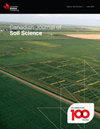黑麦草(Lolium multiflorum)种植的重肥和涝害土壤中的土壤酶活性
IF 1.5
4区 农林科学
Q4 SOIL SCIENCE
引用次数: 0
摘要
长期积水(WL)条件会改变土壤酶的活性及其在保持土壤健康方面的作用。我们评估了土壤湿度制度(田间持水量(FC)和 WL)和磷(P)比率(0、15、30、45 千克可用磷公顷-1)对(i)土壤酶和微生物生物量碳(MBC)、氮(MBN)和磷(MBP)以及(ii)溶解有机碳(DOC)和溶解总氮(TDN)的影响。在为期四个月的温室实验中,使用一年生黑麦草(Lolium multiflorum)下的完整土壤柱对处理方法进行了测试。涝害降低了土壤中 β-葡萄糖苷酶和酸性磷单酯酶的活性,但增加了 N-乙酰基-β-葡萄糖苷酶的活性。这些变化与 MBC、DOC、TDN 的变化有关,但与 MBP 无关。WL 土壤中的缺氧条件促进了厌氧菌的活性,有助于土壤溶液中铁氧氢氧化物的还原以及 DOC、TDN 和 P 的释放。加入泥浆后,WL 中细胞外酶的活性降低,这表明 C、N 和 P 的供应充足。我们的研究结果还表明,酶活性和微生物生物量都局限于土壤上层,沿土壤剖面向下移动有限。我们可以得出结论,由于这些酶分别控制纤维素、磷单酯和甲壳素的水解,土壤水分影响着种植黑麦草的肥沃土壤和水涝土壤中 C、N 和 P 的方向和大小。本文章由计算机程序翻译,如有差异,请以英文原文为准。
Soil enzyme activities in heavily manured and waterlogged soil cultivated with ryegrass (Lolium multiflorum)
Extended waterlogging (WL) conditions can alter soil enzyme activities and their role in maintaining healthy soils. We assessed the effects of soil moisture regimes (field capacity (FC) and WL) and phosphorus (P) rates (0, 15, 30, 45 kg available P ha–1) on (i) soil enzymes and microbial biomass carbon (MBC), nitrogen (MBN), and P (MBP), and (ii) dissolved organic carbon (DOC) and total dissolved nitrogen (TDN). The treatments were tested in a four–month greenhouse experiment using intact soil columns under annual ryegrass (Lolium multiflorum). Waterlogging decreased the activity of β–glucosidase and acid phosphomonoesterase, but increased N–acetyl–β–glucosaminidase in soils. These changes were associated with changes in MBC, DOC, TDN, but not MBP. Anoxic conditions in WL soil promote the activity of anaerobes and contribute to the reduction of Fe oxyhydroxides and the release of DOC, TDN, and P in the soil solution. The activity of the extracellular enzymes decreased in WL with additions of slurry indicating adequate supply of C, N, and P. Our results also showed that both enzyme activities and microbial biomass were restricted in the upper soil layer with limited downward movement along the soil profile. We can conclude that since these enzymes control the hydrolysis of cellulose, phosphomonoester, and chitin, respectively, soil moisture influences the direction and magnitude of C, N, and P in manured and waterlogged soil cultivated with ryegrass.
求助全文
通过发布文献求助,成功后即可免费获取论文全文。
去求助
来源期刊

Canadian Journal of Soil Science
农林科学-土壤科学
CiteScore
2.90
自引率
11.80%
发文量
73
审稿时长
6.0 months
期刊介绍:
The Canadian Journal of Soil Science is an international peer-reviewed journal published in cooperation with the Canadian Society of Soil Science. The journal publishes original research on the use, management, structure and development of soils and draws from the disciplines of soil science, agrometeorology, ecology, agricultural engineering, environmental science, hydrology, forestry, geology, geography and climatology. Research is published in a number of topic sections including: agrometeorology; ecology, biological processes and plant interactions; composition and chemical processes; physical processes and interfaces; genesis, landscape processes and relationships; contamination and environmental stewardship; and management for agricultural, forestry and urban uses.
 求助内容:
求助内容: 应助结果提醒方式:
应助结果提醒方式:


